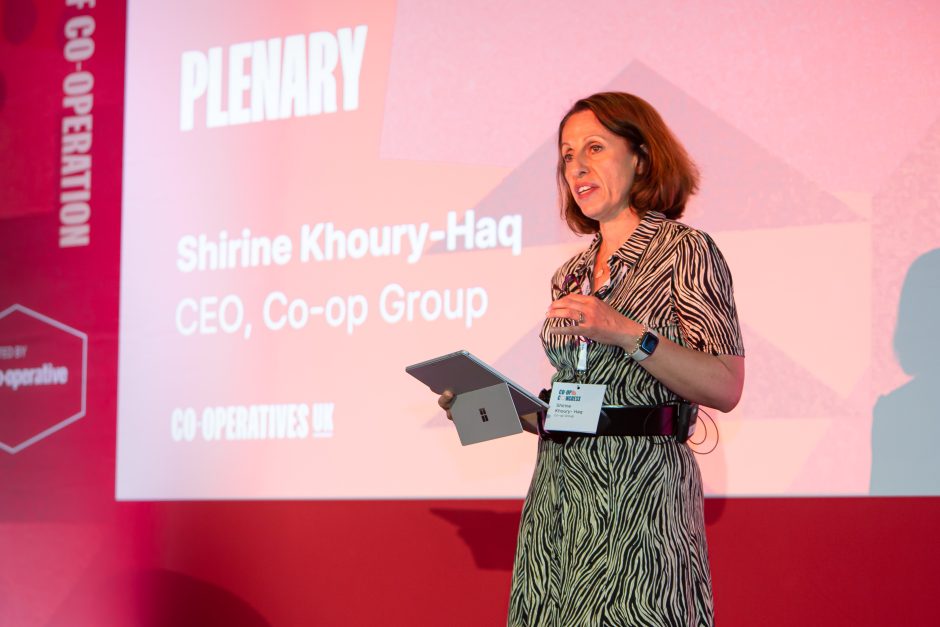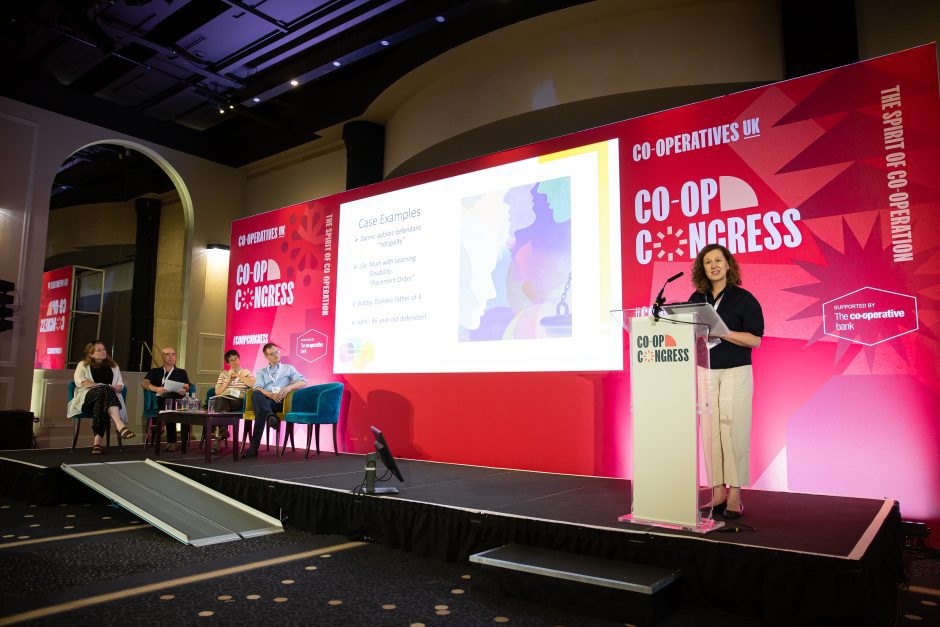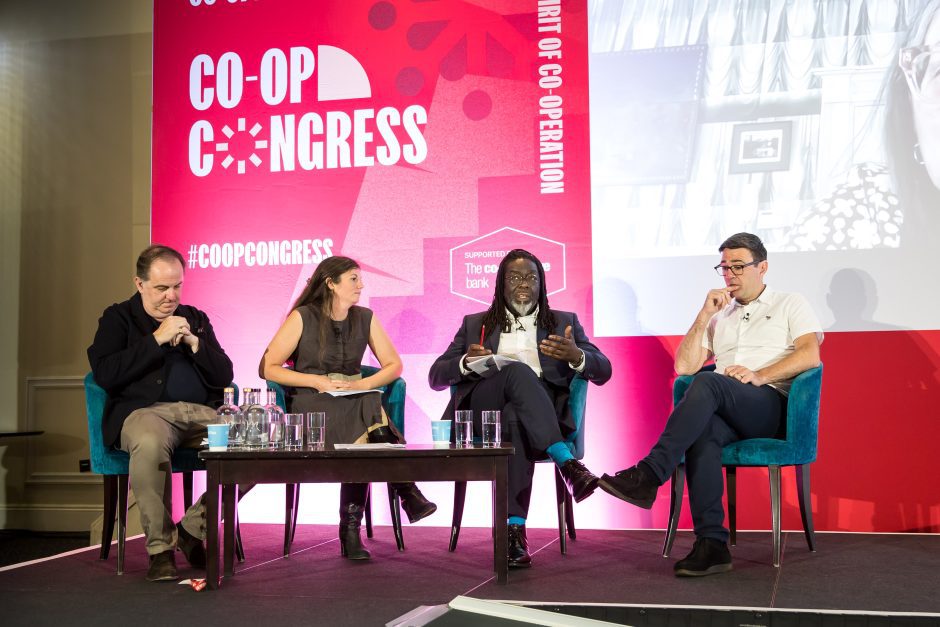“When co-ops work together great things can happen,” outgoing Co-operatives UK chair Don Morris told last month’s Co-op Congress – a powerful message repeated across the two days.
The Manchester conference, sponsored by the Co-op Bank, saw a number of high-profile announcements, including a government review of the UK’s co-op law.
Co-operatives UK CEO Rose Marley welcomed the review. “The UK’s co-operative legal framework is currently limiting and in places dysfunctional. This costs the sector millions of pounds a year in unnecessary time, expenditure, inefficiency and missed opportunities.
“When we work together positive things happen. We’ve campaigned long and hard alongside our retail co-operative society members, alongside infrastructure bodies and federal members including. From the Co-operative Party to ABCUL to the BSA, when we work together the co-operative movement moves.”

Speakers included Co-op Group CEO, Shrine Khoury-Haq, who described how the movement had shown a “tremendous amount of resilience” in another challenging year – with the Group itself ending the year in a stronger position, witnessing membership growth for the first time in five years. “Even now,” she added, “179 years since 1844, we are still embracing the values and principles of the Rochdale Pioneers, values and principles that we all in this room share.”
Khoury-Haq also talked about the power of co-operation among co-operatives, giving the example of the Co-op Group’s campaign to tackle modern slavery through its Bright Futures programme. The scheme led to the creation of the Bright Future Co-op in 2020 to help fast-track survivors of modern slavery into stable, high quality employment. The co-op currently has 33 members including the Group and Midcounties Co-op.
Two other areas of focus for the Group are supporting young people through the Co-op Foundation, and its partnership with Making the Leap to encourage social mobility.
And Khoury-Haq reiterated the importance of looking at and learning from retail co-ops in other countries which have joint membership app systems or enjoy economies of scale. “Working together allowed these co-ops to focus on their members, who, in turn, develop a greater understanding of co-ops … I look forward to seeing what change we will create for our collective future.”
Planning for a precarious future
This future, in light of the looming climate crisis, is precarious. “Either we change or we are changed,” warned Hugh Knowles, co-executive director of Friends of the Earth. In a dedicated session, he explored the role co-operatives can play in tackling the crisis.
Climate change disproportionately affects disadvantaged groups, he added, with lower-income households more likely to suffer fuel poverty. Research also shows that people of colour in England are more than three times more likely to live in neighbourhoods with very high air pollution, and ownership of electric vehicles remains something only those in higher income brackets can afford.
Related: How co-operatives are mitigating the effects of climate change
Such inequality breeds resentment and populism, warned Knowles. But there are some reasons for optimism, such as the speed of the renewable energy revolution. And while it is up to governments to set a clear path for citizens, individuals can have “extraordinary power” by coming together, he added. “That is at the heart of the co-operative movement.”
Central Co-op CEO Debbie Robinson reiterated her organisation’s commitment to cut emissions, which have already fallen 80% since 2010.
And Sarah Merrick, CEO and founder of Ripple Energy, talked about the benefits of joining renewable energy co-ops. Ripple manages project build, maintenance, and the relationship between the suppliers on behalf of a co-op, which is democratically owned and controlled.
Every little step matters, said panellists, adding that expecting people to adopt radical lifestyles could put them off: to have impact, projects need mainstream appeal.
Retrofitting homes to make them more energy efficient is one such mechanism. In a separate session, Co-operative’s UK’s James Wright warned that the UK needs to reduce its emissions from the built environment by 80% to reach net zero. A house needs to be insulated every minute – a formidable challenge but Wright said the co-operative movement has the tools to help meet it.
Related: Housing co-ops win funding bid for energy-efficient retrofits
Sandy Rushton, training manager at Greater Manchester‘s People Powered Retrofit, told how his co-op provides a householder assessment survey and works with the local supply chain to see the project through. A key aim is to replicate learnings so the work can be done more widely.
Tom Nockolds, executive officer at Glasgow CIC Loco Home Retrofit, stressed the importance of involving local communities in energy projects; without such involvement, the energy transition is doomed, he warned.
“While it’s important we have top-down support, there needs to be a bottom-up approach,” he said, adding that unless people are involved and see benefits they will veto projects. There is also a need for more public pressure to drive government action on retrofit.
“The market as it exists is a failure,” he said. “Not enough people want to insulate, and those that do can’t find a reliable supply chain.” Other barriers include the ban on onshore wind, and insufficient government support on retrofit, and public pressure is needed to force the government to act, he added.
Tom Laing, policy officer at Co-operatives UK, said co-ops can offer a one-stop shop and create more equitable outcomes, because they keep money spent in local communities.
Principle six in action
‘Co-operation among co-operatives’ isn’t a concept constrained by borders, and over the two days delegates heard updates from international visitors and the UK’s International Working Group (IWG).
Rose Marley shared some of the group’s achievements, such as coordinating the UK co-op movement’s response to conflicts and disasters. This includes raising £100,000 for Self Employed Women’s Association (SEWA) in India to help women’s co-ops weather the pandemic and donating money to DEC’s Ukraine appeal.
The IWG is also looking at ways to contribute to the International Cooperative Alliance’s consultation on the co-operative identity. “We need to make sure principles reflect what’s happening in the movement,” said Marley.
Related: SEWA Co-operative Federation’s journey to empowering informal women workers
Sara Vicari from Aroundtheworld.coop provided an insight into the Co-operative Changemakers, an upcoming documentary and impact campaign supported by Fundazione Barberini and Co-operatives UK.
In another example of principle 6, Congress discussed Central Co-op’s Malawi Partnership, working to improve the livelihoods of people in one of the world’s poorest countries. A proportion of sales is put aside for development projects in the country every time customers spend on Co-op Fairtrade products.
Charlotte Castille, Central’s head of digital marketing, membership and PR, said that when the society‘s members where surveyed a key priority was support for the UN Sustainable Development Goals – with the Malawi project fitting the brief.
Year one highlights include the sale of 57,000 thousands cups of tea and 10,000 cups of coffee.
Jane Avery, former president of Central and current director, talked about her visit to Malawi, where she found all farm work was done by manual labour: “Not a tractor in sight.”
Projects in Malawi include building work on houses – such as the fitting of new windows – and work on climate resilience, for instance with the introduction of drought-resistant tea bushes. And a mountain ravaged by deforestation was given by to the Malawi Coop by the national government, which trusted its members to do the regeneration work.
Co-operative solutions to national issues
Closer to home, Phill Clayton shared updates from Bright Future – a co-op formed to help UK survivors of modern slavery – in a session on the ‘spirit of co-operation’. Those who escape modern slavery often find it hard to get legitimate work and are at risk falling back into forced labour. By offering placements at the Co-op Group, Bright Future offered survivors a lifeline, and the partnership now extends to several businesses.
“Co-operatives can be a tool to provide solutions to issues that are hyper-local, hidden, or outside your own day-to-day experiences,” said Co-op News editor Rebecca Harvey, who was moderating the session.

One such co-op is the Intermediary Co-op, a team of communication specialists who support highly vulnerable people in the criminal justice system. “The co-operative model was the best way for us to have collective power,” said the co-op’s Nicola Lewis.
Next, Claire Stocks, a director of Chorlton Bike Deliveries, told delegates her co-op aimed to get cars “off our streets.” Activities include up-cycling bikes, and delivering food from supermarkets to charities.
And Shaun Fensom, secretary of Co-operative Network Infrastructure, told of his co-op’s efforts to break the near-monopolies of the big broadband providers, and make shared ownership the way forward. Co-operative Network Infrastructure has members in the public and private sector, including Manchester City Council and Virgin Media.
One of the deepest national issues today is the broken social care system. Andy Burnham, mayor of Greater Manchester, introducing a panel looking at co-operative options, criticised a “ramshackle” and “malnourished” system with care workers paid the minimum wage making 15-minute visits. “A big part of the solution to social care is in this room,” he said. “It’s in the co-operative movement.”
Related: Care, co-ops and the common good
The panel included Michele Rashman, a domiciliary care service user, who told of having to sell her home so she could look after her elderly parents. The social care crisis, she warned, “is going to affect us all one way or another. Whether it’s us that needs care, whether it’s our loved ones or our neighbours or our friends. At some point, we will all have to access extra care. And if it’s not there, it’s really, really frightening.”
Lord Victor Adebowale – an independent non-executive director of the Co-op Group – was also on the panel, in his capacity as chair of the NHS Confederation. He warned that the care crisis was leading to serious bed-blocking in hospitals, and criticised an “atomised system”, with venture capital businesses buying care services to extract profit.
The co-op model offers a viable alternative, said Adebowale. “Local, close, connected, bespoke, is the answer – and these are co-op principles.” He said there was nothing wrong with making a profit, “but at whose expense and where does that money go?”
He said the original consumer co-ops had disrupted a broken food market in the 19th century, and the movement should do the same with care.
The panel also heard a discussion of the work of Equal Care Co-op from its founder Emma Back. She said the co-op model could – by offering better working conditions – help to cut levels of staff turnover and create continuous relationships for service users.
Equal Care workers are “continuous,” she said. “They are committed. They are connected to the people that they can work the best with.”

Paul Gerrard, campaigns and public affairs director at the Co-op Group, said the co-op model would democratise care, “putting the person receiving support at the heart of the model”. It would also provide an alternative to the extractive capitalist model of social care, which adds to financial pressure on an underfunded system, he said.
“But there needs to be a framework for co-operatives to flourish,” he added. “We need to think about capital, we need to think about the commissioning process, we need to think about how we help them scale.”
Parallel to this are synergies and values shared by the co-op and disabled people’s movements. “What must we do to be truly inclusive and a beacon of best practice?” asked Cherylee Houston, actor and disability campaigner, in a panel exploring the relationship between disabled people and the co-ops.
Co-ops for the future
But in some areas the co-op movement still struggles – notably in attracting young members. Molly Newhouse, a member of the Young Co-operators Network, and Christopher Roseby-Bunce, a worker member of Suma Wholefoods, explored this in a session encouraging participants to discuss how co-ops can attract youth. “Create an inclusive environment, make it a positive experience right from the start, use the right social media channels, find meaningful ways to show up for young people, value ideas and perspectives as much as experience, talk to us as equals and create more opportunities to start, join or support co-ops,” they said.
Another aspect of the future being tentatively investigated by co-ops is AI. “The potential is huge,” said Rose Marley. “Joined-up membership schemes, co-operative digital infrastructure, user-owned and run digital platforms … If we are truly behind Principle 6, then tech and digital must be at the forefront of creating a movement that moves.”
AI was also touched on in a session on the media, which looked at how co-op ownership can help address challenges including democracy and media freedom; the decline of relevant, local and expert knowledge; and decent work.
“At the Great Central Gazette (a new co-operative in Leicester) we’re developing an AI policy,” said co-founder Rhys Everquill. The Gazette has a policy of zero AI-generated content. “Our website was built using AI but when it comes to journalism we want to be as transparent as possible. We want people to know we’re an authentic voice.”
Different models and sectors
A session on community shares and grassroots enterprise highlighted examples like Flo’s – The Place in the Park. Manager Makena Loehr said the co-op formed after the decision in 2017 by Oxfordshire County Council to decommission all children’s services. Locals formed a community benefit society, People Place and Participation Ltd, and after raising money through a community share offer, with booster funding from Co-ops UK, Flo’s opened in 2018, creating 40 jobs with facilities including a nursery, café and community room.
Mark Hodson, director of East Marsh United, told how the organisation rescues homes from the private rental market – subject to ownership churn with venture capital involvement and absentee landlords. East Marsh buys them for rent through the housing co-op model.
The session’s final speaker was Lenny Watson, co-founder of music venue Sister Midnight in South East London – currently past the £265,000 mark in a live share offer. People leading such ventures should know their communities, she said, and set values and objectives as well as develop a brand.
Related: Lewisham arts co-op Sister Midnight looks to create a grassroots music venue
A key funding mechanism for such projects is the community share offers, which can be backed with funds from Co-operatives UK’s Community Shares Booster Fund. The fund’s senior manager Alice Wharton noted that 92% of community-owned enterprises that have received booster fund support are still trading.
Harnessing the power of credit unions
The use of partnerships to boost the power of credit unions – with local authorities, between credit unions, and with other financial organisations – was discussed in a session led by Robin Feith, CEO of the Building Societies Association.
Jo Moscrop, chief business development officer at No1 CopperPot Credit Union, which serves UK police workers, said her organisation had recently launched a partnership with a financial mutual which had once been a competitor. As the mutual’s business model changed it wanted to offer savings products – but CopperPot already had this market covered. So the mutual offered a partnership, sending customers to CopperPot in return for commission.
Questions from the floor expressed frustration that co-ops and credit unions often operate in different silos – prompting an announcement from Sheenagh Young of South Manchester Credit Union who said the Greater Manchester credit union consortium is “about to start a fund to lend to social enterprises”.
Feith said this was an exciting development. “The whole point about community banking is the business there’s a huge demand for SME lending. And there is nothing in the co-operative world at the moment. And credit unions probably can’t meet the demand on their own.”
The BCorp buzz
Emma Laycock, member services lead at Co-operatives UK, told a session on BCorps that the apex is considering its stance on the model. It would bear the session in mind for this, she said, and continue to see feedback.
Rob Harrison, co-founder of Ethical Consumer Magazine, said BCorps are a big buzz in the corporate world, and make much bigger claims about their social good than co-ops do – even though the structure, values and principles of co-ops often means they have better ethical standards. He suggested the co-op movement would be better served making its own ethical badge rather than using the B Corps brand.
Violetta Nafpaktiti, managing director of Dotcoop, said there was no uniform approach to ethical labelling in the co-op movement. There are various ways for businesses to try to prove they are ethical, including Corporate Social Responsibility and Environmental, Social, and Governance.
During the feedback session that followed, Revolver managing director Paul Birch said his co-op had gained BCorp Status with an impressive score of 185/200. Revolver went through the process because some of its buyers wanted them to do so, he said.
Some participants thought B Corp was a greenwashing marketing campaign, while others saw a benefit in an independent body ensuring ethical standards.
Member consultation: help shape our policy priorities
Co-operatives UK’s policy and development lead James Wright and policy officer Tom Laing set out the apex’s plan to call on political parties to back co-ops ahead of next year’s election.
Co-operatives UK published four draft priorities ahead of Congress:
1. Unlock options for co-ops to raise more capital from investors and communities, including legislative reform and action by British Business Bank
2. Remove unnecessary barriers to co-operation including legislative reform of competition policy and co-op law
3. Accelerate proliferation of replicable co-op solutions in broken systems like social care, retrofit and housing by kickstarting the formation of secondary co-ops
4. Ensure communities, entrepreneurs and businesses are supported to explore and adopt options for realising their aspirations, by resourcing local co-op dev and creating legal risks for workers and communities to buy businesses and business assets.